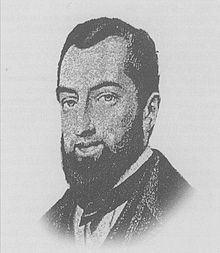Adolf Ernst Hensel
Adolf Ernst Hensel (born April 11, 1811 in Kamenz , † January 9, 1862 in Zittau ) was a German lawyer and politician. During the 1848 revolution he was a member of the Frankfurt National Assembly and briefly President of the Second Chamber of the Saxon State Parliament .
Live and act
The son of the tax officials Carl Friedrich Hensel and his wife Johanna Rosina graduated from 1829 to 1833 at the University of Leipzig to study law . There he became a member of the Old Leipzig Burschenschaft in 1830 , which is why he, like Hermann Joseph (1811–1869), later President of the 1st Landtag Chamber, was subjected to a criminal investigation. After he was sentenced to one year in prison in the first instance in 1837, he was subsequently acquitted (defended by Wilhelm Schaffrath ) before the Higher Appeal Court.
Under these conditions he was able to settle as a lawyer in Bernstadt in 1839 , where he also took over the office of city judge and became a legal councilor. In 1840 he became administrator of the patrimonial courts over the manors Obergurig and Cunewalde and the Joachimstein monastery .
As a representative of the 20th municipal electoral district, he became a member of the second chamber of the Saxon state parliament in 1845 , in which his brother, the judicial officer Friedrich Theophil Hensel , was also a member from 1839 to 1847 and during this time acted as the chamber's secretary. His contemporary Bernhard Hirschel called him the "doctrinaire of the liberals". His liberality is a "product of education" and he is an expert in the state parliament on "legal and financial issues" and on educational issues. On July 11, 1846, after taking part in his first state parliament, he was received by a festival committee of his constituents at a celebration in the Zittau town hall. After he was appointed to the paid city council by the city of Zittau, he moved there. He also had a mandate for the extraordinary parliaments of 1847 and 1848, although he did not exercise this in the year of the revolution and instead represented the Zittau court director and lawyer Gustav Woldemar Kretzschmar for the electoral district in the Second Chamber. Instead, he represented the Kingdom of Saxony in the Frankfurt pre-parliament and as a candidate for the Fatherland Association in the Frankfurt National Assembly , where he joined the German Court .
In December 1848 he moved into the Landtag 1848/49, which was elected according to the liberalized suffrage , for the 5th constituency as a candidate for the Bernstadt Fatherland Association . As Chamber President, he presided over this state parliament, the main focus of which was on the introduction and strengthening of Saxon parliamentarism and the recognition of the Paulskirche constitution by the Saxon King Friedrich August II . However, this parliament was dissolved on April 28, 1849. After the suppression of the Dresden May Uprising , in which attempts were made from May 3rd to 9th, 1849 to overthrow the king and establish a republic, he was arrested on May 28th and charged with high treason and “provocative speeches”. However, for lack of evidence, he had to be acquitted. Nevertheless he lost his office as city councilor of Zittau. He then opened a law firm. He died on January 9, 1862 in his home town of Zittau and was buried six days later in Bernstadt ad Eigen .
Fonts
- Application for the publication of a journal of the general advocate association , Zittau 1857
literature
- Helge Dvorak: Biographical Lexicon of the German Burschenschaft. Volume I: Politicians. Sub-Volume 2: F-H. Winter, Heidelberg 1999, ISBN 3-8253-0809-X , pp. 300-301.
- Josef Matzerath : Aspects of Saxon State Parliament History - Presidents and Members of Parliament from 1833 to 1952 . Saxon State Parliament, Dresden 2001, p. 67f.
- Josef Matzerath: Hensel, Adolph Ernst . In: Institute for Saxon History and Folklore (Ed.): Saxon Biography .
- Heinrich Best , Wilhelm Weege: Biographical handbook of the members of the Frankfurt National Assembly 1848/49 (= handbooks on the history of parliamentarism and the political parties. Volume 8). Droste, Düsseldorf 1996, ISBN 3-7700-5193-9 , p. 176.
- Sebastian Schermaul: The trial against the Leipzig fraternity 1835-38 - Adolf Ernst Hensel, Hermann Joseph, Wilhelm Michael Schaffrath and their work , Peter Lang, Frankfurt a. M. 2015, ISBN 978-3-631-66259-5 .
- Thorsten Tonndorf: The Saxon Members of the Frankfurt Pre- and National Assembly , Diss. Dresden 1993, p. 189f.
Individual evidence
- ↑ a b c Information on the negotiations of the ordinary Landtag in the Kingdom of Saxony during the year 1849. Second Chamber. No. 1-59, comprising the sessions from January 11th to April 30th, 1849, printed by BG Teubner, Dresden 1849, p. 30 digitized
- ↑ Bernhard Hirschel: Saxony's government, estates and people , Mannheim 1846, pp. 63–66, 101f ( digitized version )
Web links
| personal data | |
|---|---|
| SURNAME | Hensel, Adolf Ernst |
| ALTERNATIVE NAMES | Hensel, Adolph Ernst |
| BRIEF DESCRIPTION | German lawyer and politician |
| DATE OF BIRTH | April 11, 1811 |
| PLACE OF BIRTH | Kamenz |
| DATE OF DEATH | January 9, 1862 |
| Place of death | Zittau |

